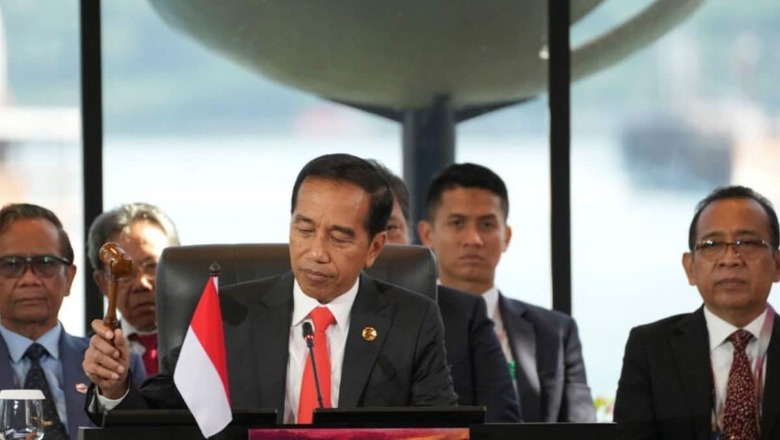
views
Indonesia, the third-largest democracy in the world, is readying to go into general elections next year. Its incumbent President Joko Widodo (Jokowi) is constitutionally barred from seeking a third term resulting in a new Indonesian head of state in 2024. While several names have been in the fray to replace Jokowi, the President’s party, the Indonesian Democratic Party of Struggle (PDI-P) has announced its candidate.
On April 21, the ruling party of Indonesia, PDI-P, announced the Central Java Governor, Ganjar Pranowo, as its presidential candidate for the upcoming elections in 2024. Indonesia’s former President and PDI-P’s General Chairwoman, Megawati Soekarnoputri, in the presence of President Joko Widodo, made the announcement at a party meeting.
Reportedly, Mdm Soekarnoputri’s daughter, Puan Maharani, was favoured by the former as the party’s candidate. Maharani, the head of PDI-P’s political and security unit and the incumbent speaker in the parliament has garnered poll numbers in the 1-2 percent range. Comparatively, Ganjar has been leading most of the pre-poll surveys with an average rating of 22-27 percent.
Ganjar Pranowo: The “fully white-haired” leader
“Look at the leader’s hair too, if it’s fully white, that means they are thinking about the people,” said Jokowi at a rally in Jakarta in November 2022. This comment at the rally hinted at Jokowi’s first and most upfront proposition of Ganjar as the prospective presidential candidate of PDI-P and as the president of Indonesia. Jokowi’s comment coincided with speculations that Mdm Soekarnoputri’s preferred choice was her daughter Maharani. Jokowi, having continuously enjoyed high approval ratings, made his preference known for the white-haired governor.
Ganjar has had a long journey as an elected representative in the politics of Indonesia. He started as a representative member of the constituency of Central Java 7 in Indonesia’s People’s Representative Council (DPR). He continued to be its member until 2013 when he stood for the Central Java gubernatorial elections and won to become the governor. Thus, becoming the presidential nominee and winning the elections would be a natural and wishful progression for Ganjar, who would be eyeing to mirror fellow outsider Jokowi’s career trajectory. The electoral journey for Ganjar and Jokowi began almost simultaneously. While Ganjar was elected as a member of DPR in 2004, Jokowi was elected as the mayor of Surakarta in 2005. Jokowi then went on to be elected as the governor of Jakarta in 2012, a year before Ganjar’s governorship began.
Ganjar comes with his fair share of shortcomings. As a member of DPR, he was accused of receiving kickbacks to procure an electronic-based Identity Card (E-KTP). He has also been entangled in land conflicts with residents of Central Java during his time as the governor. In an interesting interview, Ganjar admitted to watching porn videos. The secretary general of the Indonesian Ulema Council (MUI) snidely remarked that ‘someone with the hobby of watching porn cannot become an official (President).’ Ganjar was also one of the two PDI-P governors (the other being the governor of Bali) who protested against Israel’s participation in the Under-20 Football World Cup, hosted in Indonesia. FIFA later stripped Indonesia of the right to stage the World Cup owing to protests.
Along with his share of baggage, Ganjar carries the complete support of the incumbent President Jokowi. “Mr Ganjar (Pranowo) is a leader who is close to the people, who always approaches them and is very ideological,” said Jokowi during the announcement. While Jokowi might not have an active representative role to play going forward, his intact popularity will allow him to play a decisive role and guide his supporters to sway their allegiance in favour of Ganjar.
Other candidates and the talks of a grand coalition
Just like Jokowi and Ganjar, there is yet another governor who is eyeing to make the transition from the governorship to the top office of the country. Anies Baswedan, the ex-governor of Jakarta, who completed his term in October 2022, is an independent who has been endorsed by the NasDem party as the candidate. NasDem is currently part of the Jokowi-led governing coalition but has teamed up with the Opposition Democrat Party and Prosperous Justice Party (PKS). Baswedan is an academic with the credential of being the youngest chancellor in Indonesian history. Baswedan’s interest in the top office was first known in 2014 during his failed presidential bid against Jokowi. He won the governorship in 2017 with the support of hardline Islamists who had led the ‘411’ and the ‘212’ movements against an alleged blasphemous statement made by the incumbent Jakarta governor and a long-time Jokowi ally Basuki Tjahaja Purnama (Ahok).
The third prospective candidate has been a president-in-waiting since 2004, Prabowo Subianto. Subianto, the incumbent defence minister, has been Jokowi’s two-time rival during the 2014 and 2019 general elections. Before this, he was a contender to be Golkar’s candidate in 2004 but lost in the final round of the party’s convention. In 2009, he was announced as the presidential candidate of his newly established party, Gerindra, but lacked the required numbers to be a nominee. He then joined Megawati Soekarnoputri’s 2009 Presidential bid as her VP candidate but the duo emerged as runner-ups. Prabowo has a checkered past as the Army General during the reign of his father-in-law Suharto. His active role in human rights violations during the 1998 riots led to his being discharged from his military duties. In a surprise move, Subianto joined Jokowi’s cabinet in October 2019 after having been his rival in two consecutive elections. The leader of Gerindra is touted to throw his hat in the ring once again, and probably for one last time, in 2024.
Until PDI-P’s announcement of Ganjar as its presidental nominee, Jakarta was ripe with the conversation of a grand coalition coming together. This grand coalition included PDI-P along with the parliament’s second biggest party, Golkar, which has formed a coalition called Koalisi Indonesia Bersatu (KIB) with Partai Amanat Nasional (PAN) and Partai Persatuan Pembangunan (PPP). It also included the coalition between the third largest party, Gerindra, and the National Awakening Party (PKB), called the Koalisi Kebangkitan Indonesia Raya (KKIR). President Jokowi had held meetings with the leaders of two coalitions and there was speculation of a Ganjar-Prabowo or a Prabowo-Ganjar ticket from the grand coalition. But since Prabowo Subianto had already announced his intention to contest and given his unfulfilled dream, it would have not been possible for him to be second on the ticket to his political junior Ganjar. But PDI-P on its part, as the largest party in the parliament, would have wanted its person on the top of the ticket. While this probable coalition would have been a potentially victorious one, tying up such a mammoth coalition is an uphill task.
As things stand today, PDI-P has announced its candidate in Ganjar Pranowo and NasDem has announced its support for Baswedan. Subianto has shown his intention and in all probability will be the candidate of the KKIR coalition. Thus, the battle, as of today, will be between PDI-P, the NasDem coalition and a probable big coalition between KKIR and KIB. But the potential presidential and vice presidential candidates have time till October to register themselves with the Election Commission if they want to contest in the polls of February 2024. With approximately five more months to go, several permutations and combinations can be at play in Indonesian politics and the final picture could look different from its present form.
Ashutosh Nagda is an independent researcher and an electoral consultant. He is an alumnus of SOAS, University of London. He tweets @nagdashutosh. Views expressed are personal.


















Comments
0 comment